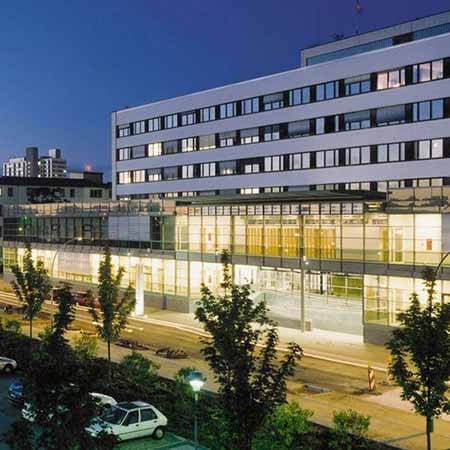Syncope (fainting) is a loss of consciousness with its subsequent spontaneous recovery. Hundreds of diseases can lead to syncope, but the mechanism is always based on the deterioration of cerebral circulation. Syncopal episodes can occur against the background of dizziness, darkening of the eyes, nausea, blurred vision, or without any prerequisites. You can undergo your diagnostics and treatment of syncope in Germany to find out the cause of the fainting and get rid of it forever.
Content
- Causes
- Diagnostics
- Treatment
A patient is examined to find out the cause of syncope, and then these causes will be eliminated. To do this, doctors use conservative therapy, lifestyle modification, and interventional cardiac procedures.
You can undergo your treatment in one of the following hospitals: Beta Klinik Bonn, Bundeswehr Hospital Berlin, or University Hospital Ulm.
Booking Health will take care of the organization of your trip. Our company's specialists will help you to decide on the choice of a clinic and an attending physician, draw up a preliminary diagnostic program, inform you on the cost of medical services, and make an appointment. After that, you will receive an invitation for treatment, and Booking Health will help you apply for a visa and come to the clinic. An interpreter will accompany you to the clinic, and a personal medical coordinator will provide support for any questions that may arise.
Causes
The causes of syncope can be divided into four groups:
- cardiovascular diseases;
These conditions are the most common group of causes of syncope. Fainting may be due to an inefficient circulation, which causes insufficient blood to reach the brain tissue. Arrhythmias, tachycardia, bradycardia, valvular heart disease, myocardial infarction, heart failure, and pulmonary embolism lead to syncope.
- damage to the cerebral blood vessel;
- impaired vascular tone;
This group of causes includes vasovagal syncope (impaired vagal tone), carotid sinus syndrome, orthostatic hypotension, and situational syncope. Orthostatic hypotension is called a sharp drop in blood pressure when moving from a lying position to an upright position. This condition can be triggered by drugs, vegetative vascular dysfunction, and peripheral nerve lesions. It is often found in older people. Situational syncope can be caused by coughing, swallowing, defecation, etc.
- other types of syncope.
This group includes psychogenic causes (for example, panic attacks), epilepsy, metabolic disorders (anemia, oxygen starvation of tissues, or low blood glucose levels) and other causes.
The most common physiological (non-disease related) cause of syncope is vasovagal syncope. This can be associated with prolonged standing, hot weather, fatigue, severe pain, stress, and other factors. They cause a slow heart rate and vasodilation, resulting in the brain receiving little oxygen. A person loses consciousness, which is frequently accompanied by involuntary urination and defecation.
Diagnostics
Patients require a thorough examination to determine the cause of syncope. Diagnostics includes:
- an ECG;
- heart rate Holter monitoring;
- a CT scan of the head;
- ultrasound examination of the carotid arteries;
- a brain MRI;
- MR angiography;
- electroencephalography;
- laboratory tests.
This long list does not mean that every single person will need all the above-mentioned diagnostic procedures. Sometimes a single procedure is enough to determine the cause of your syncope. For example, an ECG allows doctors to find out the origin of the syndrome in 5% of cases, while the use of blood tests allows for this in 2% of cases only.
Treatment
It is not the fainting itself that is treated, but the condition that causes it.
In the case of frequent vasovagal syncope, a patient is advised to drink more fluids and consume more salt to increase blood pressure. If these measures are not enough, drug therapy with beta blockers or serotonin reuptake inhibitors is indicated.
Patients with orthostatic hypotension are advised to get out of bed more slowly, and diuretics and vasodilators are also discontinued. Compression stockings may be required to keep blood from pooling in the legs. If there is not enough fluid inside the blood vessels, infusion therapy may be required.
Syncope is often associated with arrhythmias. There are a large number of them, and each arrhythmia requires a different approach to treatment. In any case, syncope caused by arrhythmia is dangerous, and if such a connection is established, then a patient needs treatment. Each loss of consciousness can end in sudden cardiac death.
To diagnose arrhythmias and find out their origin, doctors use an ECG, 24-hour Holter monitoring, echocardiography, and electrophysiological studies of the heart. The main treatment methods include:
- drug therapy;
- radiofrequency ablation of additional pathways or sources of a pathological rhythm;
- implantation of a pacemaker (artificial rhythm driver), which does not allow the rhythm to slow down too much;
- placement of an implantable cardioverter-defibrillator, which gives an electric shock in the event of a life-threatening tachycardia to restore a normal heart rhythm.
All invasive procedures for the treatment of syncope in Germany are minimally traumatic and performed through the blood vessels. After such a treatment, patients do not require any rehabilitation.
You can go to one of the German hospitals to undergo your diagnostics and receive top-class medical care. You are welcome to use the Booking Health service to check prices, compare the cost of treatment in different medical centers and make your treatment appointment at the best price. Our company's employees will help you to find the most suitable clinics in Germany and arrange your trip.
Authors:
The article was edited by medical experts, board-certified doctors Dr. Nadezhda Ivanisova and Dr. Sergey Pashchenko. For the treatment of the conditions referred to in the article, you must consult a doctor; the information in the article is not intended for self-medication!
Sources:
National Institutes of Health
MedicineNet














